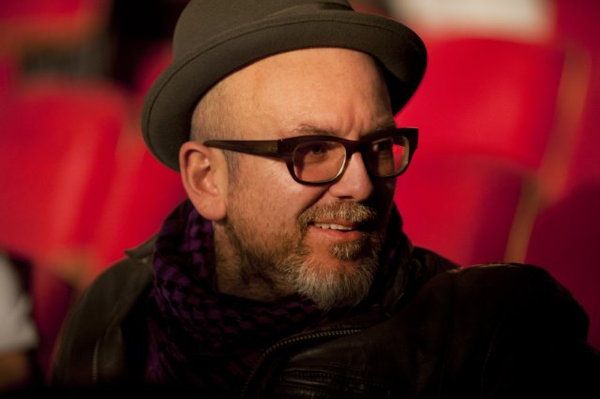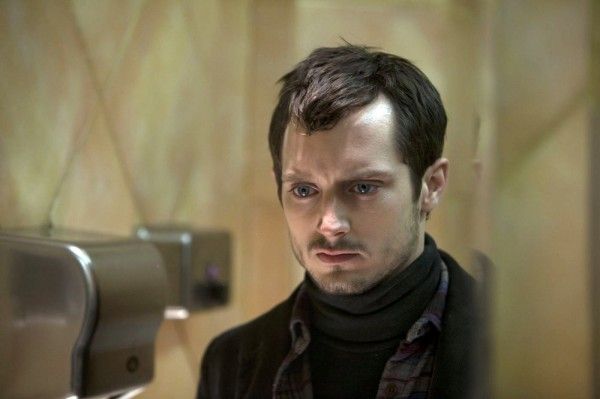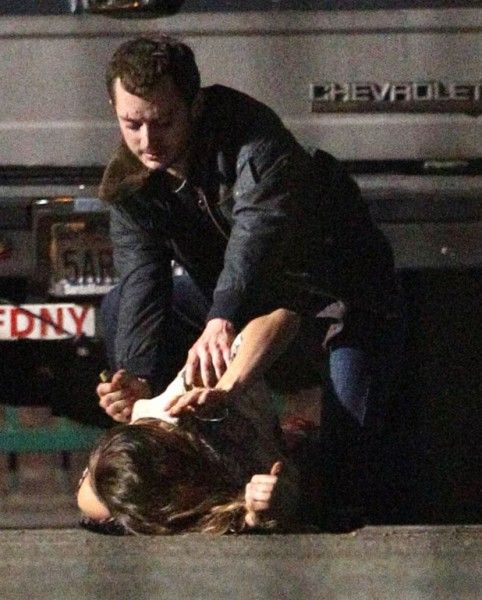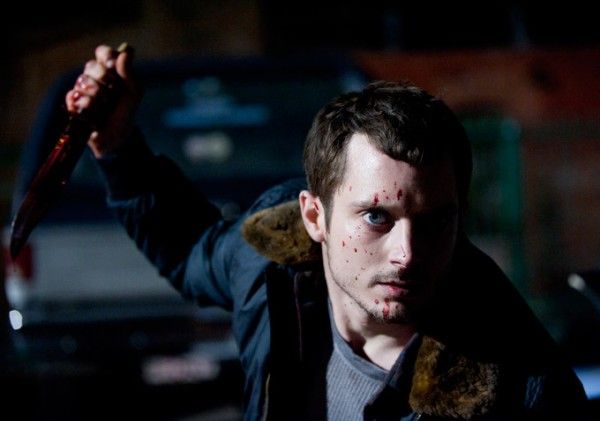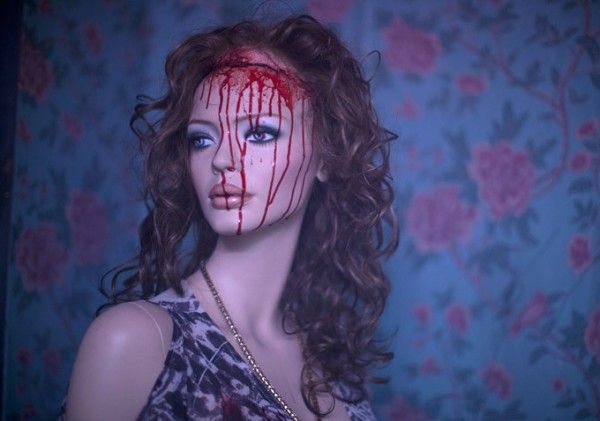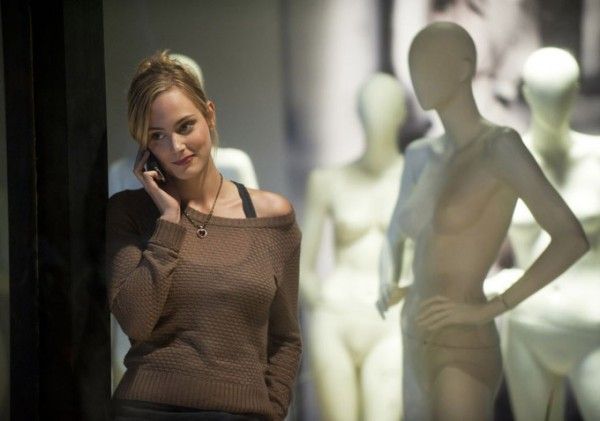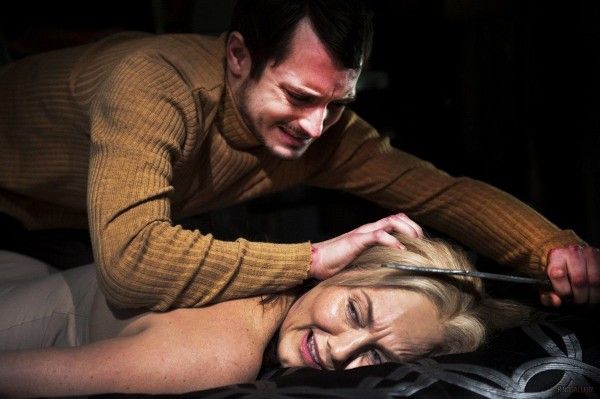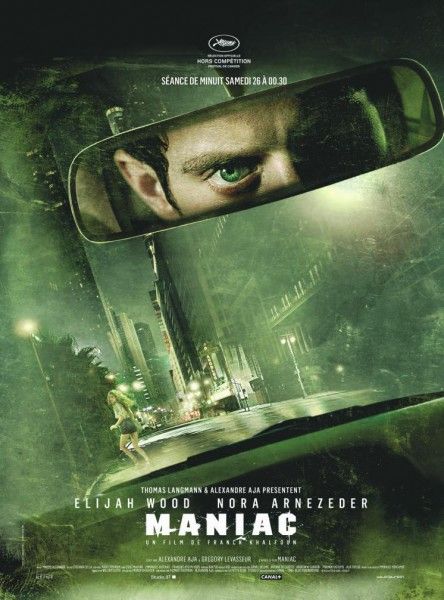A good remake is hard to find. While I’m not inherently opposed to the idea, as so many are, there is always that hitch in your breath when you hear an iconic film is being given the remake treatment. Fortunately for fans of Maniac, director Franck Khalfoun hits all the right marks with his updated version of the 1980 slasher. Khalfoun maintains the basic set up: a deranged, but sympathetic mannequin store owner, Frank (Elijah Wood), spends his nights scalping innocent women as a result of his abusive past. However, Khalfoun puts his own stamp on the material, shooting the entire film in POV format and changing the setting from New York to L.A. It works. Backed up by strong performances, gruesome effects, and an excellent soundtrack, Khalfoun’s Maniac provides a spin on the original that can horrify modern audiences anew.
Earlier this week at the film’s L.A. press day I had the opportunity to speak with Khalfoun. We talked about working with Elijah Wood, the challenges of shooting a film in POV, why the film was set in downtown L.A., and the soundtrack by Rob. We also discussed bringing something new to a remake, his favorite kills of the film, why practical effects were important, and a lot more. Check out what he had to say after the jump.
Collider: First I just want to say that I think P2 is an extremely underrated movie.
FRANCK KHALFOUN: I agree with you [laughs].
I really like it.
KHALFOUN: I agree with you, I love that little movie. I appreciate it. I think that movie stands on its own. I mean, go make a movie with two people…in a parking lot of all places. It was difficult and I think it works. Thank you.
I always watch it during the Christmas season.
KHALFOUN: [laughs] That’s your Christmas movie? That’s funny.
Jumping into Maniac, tell me a little bit about the decision to cast Elijah. Did you always want to go with an actor that has kind of a nice-guy reputation?
KHALFOUN: Yes, I always thought that for me the unassuming, friendly looking guy next door is certainly scarier as a monster than the monsterish looking predator, because he can lure people in, it’s easier. For me the Ted Bundy type is the scariest type of serial killer because they’re charming, they’re smart, they’re good looking, and it’s deadly. It’s absolutely deadly. Obviously, look, the process of finding an actor is always difficult and there’s always so many variables that come into play, but when Alix Taylor, one of the producers, mentioned him and had a relationship with him I immediately thought of those eyes, those blue eyes and how kind they are, really. If that can do evil then there’s no stopping anyone, it’s possible in anyone. Also, actors sometimes carry baggage, fans associate actors with certain parts, and if they were ever going to do that with Elijah it would be great because we would destroy all that and they would have this feeling that this is a nice guy. I think predominantly he has a pretty good image out there. Somebody said to me after a screening, “I feel like I just watched my puppy get run over by a car.” And I said, “That’s great. I understand exactly what you mean.”
How early on in production did you know you wanted to go with the POV format? Was that there from the beginning?
KHALFOUN: From the beginning – well, I mean, originally I got a script that was just sort of a classic script and from the amount of backlash we received from fans about me doing Maniac, and just me in general knowing we can’t just re-do the movie that everybody’s been biting all these years – myself included, Aja included. There’s a scene in High Tension, which I’m in, that is a bite from Maniac, so it’s full circle. That was ten years ago and now you’re asking me to actually remake the movie that everybody considers iconic. It’s daunting and I told Alex Aja and Thomas Langmann, another producer on the film, “Unless we find something clever and a different way of making this movie, I don’t know if we should do it.” Who needs another serial killer movie anyways unless you can do something new?
What were some of the challenges of shooting a feature film in POV?
KHALFOUN: There’s two challenges. The main one is that you’re not seeing your main character. Making a movie is about following characters and embarking on an adventure with them, seeing their reactions, and seeing what they do, having empathy for those characters, feeling for those characters, embarking on this adventure. That was stripped, now all the sudden we weren’t going to be seeing the main character so we had to come up with ways to see the character and still stay within the concept of POV. The other thing is, and this goes mostly to making genre and scary movies, but scaring and creating tension is very technical and it require a lot of coverage. It requires the stretching of time. Walking from this point to that point, walking ten feet and making that last a minute and a half on screen time, because you don’t know what’s going to happen in those ten feet. That’s technical, that’s something you do technically – coverage and Lenses, these were gone now because I was doing a movie with only one point of view.
In fact, when you watch the movie it’s not scary in your typical way. You’re not with the unsuspecting victim waiting for the cat to jump out of the closet. You are stuck in somebody’s brain so how can you create fear? That aspect of not knowing where the killer is, you’re with the victim, you don’t know where the killer is so you’re sharing that experience and that is terrifying, not knowing who’s inside that door, if there’s anybody and if something’s going to jump out at you. But if you’re with the killer you’re always watching so that element of surprise is gone now. Certainly you can still see the reaction in the victim, but part of that is gone. So technically it’s a challenge and emotionally it become a challenge because you don’t share the – it’s funny because you are complicit in what he is doing, so what I’m saying is being complicit in the action replaces seeing the reactions of your characters, which brings on a whole different set of emotions and feelings. At the same time that you are watching the movie you are able to see it go on, but you know that you will have to kill, you’ll have to participate so that creates a strange emotional feeling.
For me the scares came out of a bit more of a mental place than a visceral reaction, especially because I’m a woman living in L.A., it was very scary for me to see the simple and realistic way he would kind of find his victims.
KHALFOUN: The stalking.
Yes – the online dating, coming out of the club, public transit, it’s all very relatable. So how much thought did you put into the ways that he would stalk them and sort of prey on them?
KHALFOUN: Obviously the online thing is more modern, something from today. Then just driving around stalking from your van is a throwback to how it was done in the 80’s, back in time. I wanted to have a little bit of everything. I love what he says in the beginning when he’s moving on to the next victim online he says, “It’s my first time online,” which is what everybody says when they’re dating online, “I don’t do this. It’s my first time.” So that made it that much scarier, because everybody who’s ever been on those sites has got the “I don’t usually do this.” Everybody says it, so be careful who that person is.
The soundtrack is amazing.
KHALFOUN: Amazing, that’s Rob, he’s amazing.
It’s got that throwback sound, kind of like Goblin or the old Carpenter scores. Did you know you wanted that kind of sound straight away? What was the process of settling on that?
KHALFOUN: I was wrestling between that and some really grungy, really dirty hardcore metal shit. Then meeting Rob it was so clear, first of all it’s an homage to those 80s films, and then electronica and how hip it is today, it made sense on so many levels. Then it’s just such an emotional soundtrack. You know Rob is in that French group called Phoenix, so he’s part of that and he’s incredibly prolific, very talented. So much music, I would send him a scene and he would send me a wealth of stuff. I mean I didn’t use 80% of it because it was just too much. He just gave me so much. The movie is filled with his music and there was so much left over that we couldn’t use. He’s very, very good.
I think you made the right choice because it works so well.
KHALFOUN: It’s beautiful, isn’t it? It’s epic. It’s also a way to create an emotion because again, you don’t see your character o how do you feel? The music becomes that much more important, the image becomes that much more important. What you see, how it translates, and how it creates emotion, because you’re not seeing the face of your actor. Technically the movie becomes all about transmitting a feeling.
How did you choose those spare moments where we do see him?
KHALFOUN: I needed to see him at some point. It’s hard to sustain not seeing your character through a whole movie so we had to figure out ways for me to see him sometimes. Once you see him you want to see him again soon so you start looking for him throughout the film. One of those was mirrors and reflections, obviously if you’re looking in a mirror you see yourself so if you’re in a guy’s brain you can see him see himself. Another one was dreams, when you’re dreaming you see yourself a lot of times in your dreams so that conceptually stayed within the framework of POV. Then in reading and doing research I saw that a lot of these guys, a lot of these killers, have out of body experiences where they aren’t in themselves, they’re being pulled out and watching themselves kill from the outside. So I thought that’s interesting, we’re still within him but were experiencing this out of body thing. So that’s why it pulls out.
That’s the shot I was really curious about, the one in the parking lot.
KHALFOUN: Where he’s killing and all the sudden we pull out and you see him doing his thing. He’s experiencing watching himself. He’s having an out of body experience while committing this horrific act.
That is very cool.
KHALFOUN: It is cool and it allows us the audience to participate an experience that serial killers have talked about, and it also allows us to see the character as he commits his crime.
Obviously directors usually work pretty closely with their DPs, but what was the experience like this time around working with Maxime [Alexandre] since he is essentially representing the main character.
KHALFOUN: The difference was how involved he was with the actors, with Elijah particularly. This movie became about rigging cameras and making it seem like you were watching from somebody’s face, and if you want your move to look good you have to have good lenses. Good lenses are heavy and they require bigger cameras, all of the sudden you’re not shooting with a GoPro in front of someone’s face, you actually have a real camera and that becomes a challenge to achieve shots. Where somebody is putting hands in front of them because the lens comes out to here, it’s big and it becomes a real challenge. Turns out that we had multiple hands in the film to be Elijah. So it would all be choreographed, one hand would grab the head, the other hand would grab the knife. It’s not always the same person playing the hands. So technically it became a challenge, and then Maxime and Elijah became very close because Elijah guided him through what he would be doing. So they became very close. It was interesting to watch. We would design the shots and then Elijah would be involved, because it’s his character so it’s important that he has input. It’s vital for me that he has input. It was a melting pot of the three of us, of our creativity. Maxime would light it, I would compose the shot, and Elijah would infuse his character. It was a very creative process, very cool for a little slasher wouldn’t you say?
Absolutely; I dig it. Since Elijah’s on camera time was so little did you expect him to be as involved as he was?
KHALFOUN: Yes. I mean, it wasn’t required of him, but I expect all good actors to be involved more than what they are contractually involved in. Some don’t care, some are good. I expected Elijah – I heard that he was a great guy and really made me like actors again. When you’re able to get an actor of Elijah’s caliber in a film of this budget it’s because maybe you don’t need him the whole time, he can just do a few days here and there, and since we had a POV concept it was possible that he could just come in for those moments where you see his reflections and stuff. I think he quickly realized that his character was going to live through the other characters and if he wasn’t there to deliver lines and participate that his character might suffer ultimately. So even though he was contracted to be there for a few days he came every day and was ready to go. He was very, very gracious in that manner and that really is a big reason, I think, that the movie functions, that its successful, is because he was every day he was there contributing.
I’m curious about the motivation behind the decision to set it in L.A. this time instead of New York.
KHALFOUN: When I read the script it said “Lower East Side. One in the morning. Empty. Devoid of people.” I was like, “That New York is gone.” It is. Nowhere in New York – I mean it’s the safest place in the country. There’s people everywhere and you can’t get away with a crime the way you used to. It’s really a safe place. I remember living in Los Angeles in the 80s and it was desolate downtown and it’s still that way in some parts. So there was the architectural beauty, this sort of decadent past of the 20s and 30s downtown where all these gorgeous building now have been abandoned. There’s a real mix of homeless, and artists, and wealthy people all mixed in the middle of downtown all sort of interacting with each other. That seemed like a better setting, a more logical setting for the character who is an artist, who ended up meeting another photographer artist, and that a relationship might start. And what a great place for a hunter, for a stalker, to find victims. And also I think that that particular location is what symbolizes and personifies the character. Somebody lost in the past, isolated now, and trying to find a new identity to get himself out of what he was, which is what downtown is, downtown is now rejuvenated.
Going through a rebranding.
KHALFOUN: Rebranding, yes, and so is the character. He’s trying to change his ways, trying to be a different person, a beautiful person darkened by his experiences. So the city and the character are connected in that way.
The way you talk about him, and the way that it comes across in the movie, it semms like you have a level of sympathy for the character.
KHALFOUN: Completely, it all started with sympathy. That’s what stayed with me from the first time I saw the original and that’s what I went into this movie trying to recreate. I wanted people to like this character. I thought that would be so brutal if you were watching this from his point of view, you like him, you feel bad for him, and yet he does all these horrific things. When I saw Joe Spinell performance that’s what marked me. Beyond all the violence and the gore and the misogyny and the horrible things he does to women – I forgot about the women, I felt so bad that this is his life, that this is what life had given him. That never left me and I thought it was fascinating. And beyond all the horror and the fear that I project in this movie I think that in the end when you still have enough faith in humanity to think that perhaps this man can change then the movie ultimately is positive.
I think you did a really nice job combining the audience’s sympathy for Joe with, like you mentioned, their complicity in his behavior. It just really makes you feel like shit, but I mean that as a compliment.
KHALFOUN: Yeah, you’re participating, you’re involved and there’s no getting around it. You can’t get out, he can’t get out. He can’t stop and you can’t stop watching and therefore you are both complicit in what you’re doing. There’s the horror.
I kept watching it going, “Oh, please don’t kill this one.” [laughs]
KHALFOUN: But you know what’s happening, you’re doing it. You can stop it.
Just turn it off.
KHALFOUN: That’s right, but you don’t. You keep watching. It’s your fault. And that was the whole thing, that was sort of the gimmick for me. You’re stuck in there and it was the irony of kind of being stuck in there – please run, but please let me see more.
I watched that 20 minute behind the scenes video of the makeup effects that’s online, which is awesome. How important was it to you that you make the film with practical effects?
KHALFOUN: Very important, I don’t think CG effects work very well unless they’re just there to enhance. I don’t think completely generated effects work, they’re not very organic and you don’t get any – they’re soulless to me. They don’t have life. And most of the stuff that we’ve done, certainly with all the mirrors, they’re all practical. There’s no green screen or anything used in the film and the little CG we have is just to enhance certain things. Yeah, it’s very important. It just seems so much more organic to me to actually see the skin being cut into and bones crunching and falling, being anatomically correct. I think it leaves a resounding impression on the audience whether they know it or not. It feels right and it feels that much more powerful.
Do you have a favorite kill scene in the film? You can be vague so we don’t spoil anything.
KHALFOUN: I think that the one of the art dealer is brutal, because there’s so many layers to it psychologically. You really deal with his past, and it’s not your typical victim from a horror film. She’s older and it’s just brutal, it’s disrespectful in every way. It’s pretty intense. I like that one and I also like the brutality of the parking lot. I think it’s really, really raw. And I have a child with that woman.
Wow, I did not know that.
KHALFOUN: We’re like – oh boy, one day our daughter will see that and be like, “What the heck?”
Just be prepared to pay for that therapy.
KHALFOUN: [Laughs] Exactly.
In regards to making a remake, is that something you would ever want to do again? Or are you kind of one-and-done on that?
KHALFOUN: No, I think it depends. Look, it’s so hard to get anything done in this town that you’re always open to all kinds of projects and suggestions. People talk to me – I think for every script you read, for every three scripts one of them is a remake. It’s so much easier to get something that has a brand and already has a following. So you always have to be open to it. I just know that I will always try, if I’m being asked to do it, I will always try to do it in a way that is fresh and allows us to get a little more insight, that is not just a rebranding for the sake of making money for the producers. That it’s actually a real film and it stands on its own. So many movies I’ve seen, that people have seen, that you’re like, “Oh, wow that was a remake? I didn’t know that.” There are so many movies out there that are remade that you didn’t know about, either from Europeans, Asian films…so it happens all the time. It’s just how do you treat the subject matter? How do you connect it to today’s audiences?
What’s coming up next for you?
KHALFOUN: I just shot a film called I-lived. It’s about a self-help app that you get on your phone, it helps you achieve goals, and you have to film yourself – basically you put your goals in life and it gives you a set of missions to accomplish to achieve your goals. You have to film yourself doing these, performing these tasks, and you slowly find that your life is changing, that you’re getting what you want out of life. It’s almost magical, but things are changing. Every time you ask this app something it gives you a list of things to do and it works. The more you ask, though, the more the app asks of you and eventually you start asking the question of what did you sign when you signed that user agreement. It’s called I-Lived and its coming out soon.
Sounds very interesting, I can’t wait to see it. Thanks so much for giving me your time today.
KHALFOUN: It’s a real pleasure.

